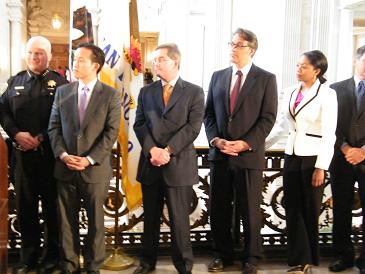As the Board of Supervisors prepares to give final approval today to the Twitter/Mid-Market tax exclusion zone, a behind-the-scenes power struggle over who will control corporate contributions to community groups has broken out between the two city offices that pushed this the hardest: Sup. Jane Kim and the Mayor’s Office of Economic and Workforce Development.
During last week’s board discussion before the 8-3 vote to approve the legislation, Kim announced that she intends to create a seven-member citizen’s advisory committee (CAC) to oversee the community benefits agreements (CBA) that Twitter and other large corporations who seek the tax break are required by the legislation to agree to. That role is now played by the OEWD, where the Twitter legislation originated, and supervisors are barred from interfering with those negotiations.
That move prompted OEWD’s Amy Cohen to send out an April 4 message from her personal email address to community groups that had been supportive of the legislation trying to rally opposition to Kim’s proposal, warning that Kim was trying to use a body to which she would appoint all members to control how the corporate contributions were distributed.
“This is really problematic, since it could essentially negative [sic] the ‘incentive’ – they could shake companies down for anything, virtually controlling who does and doesn’t come to the neighborhood and directing money to any beneficiary they want to – and will also extend this process a few more weeks, opening it up to yet more public comment etc. We’ll lose Twitter and surely others, not to mention look like we really don’t want change in the neighborhood,” Cohen wrote.
She continued, “Please ask Jane to not make the amendment and not delay the vote. Don’t let on that you know specifics of this amendment. PLEASE. You can say that you know there have been some demands around community benefits, etc. You can say you even heard there are people who want to delay.”
Cohen then created a list of “very rough talking points on our community engagement strategy” for recipients to use, although she advised recipients “please don’t circulate.” They included arguments that a new body wasn’t needed because the Mid-Market Project Area Committee could play that role, the fact that Kim appointing all the CAC members is “not equitable/fair” and the body would have too much power, the “legal question is whether a CAC can even have binding authority,” and “there’s momentum now for the vote. We don’t need more public comment.”
Cohen, Kim, and OEWD Director Jennifer Matz haven’t returned calls for comment. Kim legislative aide Matias Mormino confirmed that the legislation as originally written called for the CAC to have binding authority to negotiate the CBAs, but the City Attorney’s Office said that conflicts with a City Charter provision barring supervisors from interfering with contracts of less than $10 million or 10 years duration. That anti-corruption law is intended to prevent supervisors from directing funds to favored constituencies.
“We’re running into that problem, so the way we’re working it is they will need to conduct a public hearing,” Mormino told us. He said the CAC will work with corporations on crafting the CBAs and conduct public hearings on them, a role that he said is appropriate because they know best what the community’s needs are. And he said Kim is in the best position to decide which groups and individuals should be represented on the CAC.
Ultimately, Kim did vote to move the Twitter legislation along quickly, despite an earlier pledge to delay it until after the CBA with Twitter had been negotiated (it still isn’t complete and will be the subject of trailing legislation). But Kim also made a last-minute amendment to change the agency that will negotiate the CBAs from OEWD to the the City Administrator’s Office, attributing the change to input from the community.

